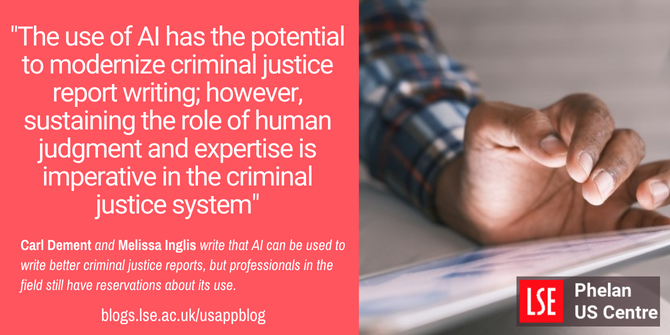
 Artificial intelligence (AI) technology to enhance and assist writing have gained much media attention recently and have been utilized in many professions. One area that has been relatively reluctant to utilize AI assisted writing is in criminal justice. Recognizing the practicality that AI could have in criminal justice report writing and the impending use of the technology in the field, Carl Dement and Melissa Inglis conducted interviews with criminal justice professionals to find out their perceptions of the utilization, benefits, and challenges of AI technology in the criminal justice system.
Artificial intelligence (AI) technology to enhance and assist writing have gained much media attention recently and have been utilized in many professions. One area that has been relatively reluctant to utilize AI assisted writing is in criminal justice. Recognizing the practicality that AI could have in criminal justice report writing and the impending use of the technology in the field, Carl Dement and Melissa Inglis conducted interviews with criminal justice professionals to find out their perceptions of the utilization, benefits, and challenges of AI technology in the criminal justice system.
In November of 2022, OpenAi launched ChatGPT an Artificial intelligence (AI) chatbot, sparking continued debates over the role of AI in many aspects of society, from writing text to generating images and other media. In the criminal justice system, most use of AI has been limited to predictive policing and risk assessment. The use of AI in report writing has been minimal, limited to occasional individual use and often widely scrutinized for misuse, such as the case of a New York law firm that used ChatGPT for legal research, and was found to have used references to nonexistent legal cases. Through this research many misconceptions were discovered about the use of AI for report writing. ChatGPT, Bard, and Bing are all commonly used types of AI that emphasize natural language processing and generation. How those tools are utilized is determined by the user. In other words, the tools can be utilized not to generate a report in its entirety, but to automate specific tasks, such as data entry and formatting of reports, potentially saving time and reducing errors.
What do criminal justice professionals think about the use of AI?
To gain an understanding of perceptions about the use of AI in criminal justice report writing, we used semi-structured interviews which allowed a dialogue between researchers and the criminal justice professionals in the study. This qualitative method of data collection obtains a deeper understanding of issues compared to many other types of research. This method allows researchers to delve into topics, ask relevant follow-up questions, and ultimately answer typically unquantifiable information about human experiences.
The professionals in our study were based across central, southeast, and south-central Oklahoma and had experience ranging from four to 35 years. They came from across the criminal justice system, including attorneys, judges, public information officers and those in forensic, carceral, and law enforcement settings. After analysis of the 23rd interview we determined that no new themes were emerging in the interviews. As part of our analysis, we created 32 codes to categorize what we found, and from these codes six themes emerged, representing nuances in the data that describes overall perceptions of AI in report writing.
Themes from our interviews on perceptions of AI
The first theme was the high frequency of poor-quality reports seen by participants. Supervisors reported spending a great deal of time on reviewing, returning or correcting reports. One supervisor who reported reviewing 50-75 reports per day stated that less than 20 percent of reports he reviewed were approved during the first review. This decreases productivity for all professionals involved in the report writing process for agencies. Additionally, many agencies in this study still utilize handwritten reports. The utilization of handwritten reports further exacerbates the problem of errors, editing, and sharing documents within and across agencies.
Training on how to write and recognize standard elements in reports emerged as a second theme. Prosecutors indicated they often provide training to agencies they work with on how to improve reports that will ultimately increase prosecution rates. Other professionals we spoke to indicated that writing instruction for new hires is often limited. Several professionals indicated that guides or templates are given to help remedy the problem of missing details and accuracy in reports. Notably, such templates and guides could be utilized with the use of AI to increase accuracy of reports.

Photo by Towfiqu barbhuiya on Unsplash
The third theme was a general lack of knowledge about AI and the negative perception of AI. Even though most professionals in the study had never used AI for report writing, most had an initial negative perception of AI, which seemed to be driven by media portrayals. Despite initial negative perceptions, some clarifications were made, and explanations given about AI in report writing, and there was a growing acceptance of AI among some of the professionals in the study. Interviews revealed that some forms of AI have been used in the investigative process for years, such as AI-powered tools to search digital devices and web content for criminal evidence. Wide acceptance for those tools may be due in part to terminology used in court (i.e., specific software names rather than the term AI). Within the theme of negative perception, was the concern of privacy and sensitive information, especially concerning cases involving juveniles. Data retention and review policies of AI providers were mentioned as specific areas of concern. This is a legitimate concern, as Bard warns users against including identifying information and prompts users to review Google’s privacy policy. Professionals who do not handle juvenile cases were less concerned, citing that most of their work becomes public record.
The fourth theme was the critical need for human oversight and responsibility in the use of AI. Attorneys in the study emphasized the importance of street level officers possessing a comprehensive understanding of the reports they generate and being able to take full responsibility for those reports.
A fifth theme that emerged was that even once educated about the use of AI, professional should never view AI generated reports as a final product, but as a draft that must be reviewed. All information in reports must be reviewed for accuracy of details in each case. Defense attorneys in this study reported they often challenge details within reports generated by officers and other criminal justice professional. This reiterates the importance of reviewing reports with precision to accuracy and details.
The last theme that emerged was the potential of AI to be a productivity increasing tool. Law enforcement supervisors in particular saw potential in shifting report writing from “how to do it” to “what to do” as a valuable way to increase productivity and reduce time in report writing. This is particularly important to law enforcement as departments suffer ongoing officer shortages across the nation.
AI can have a role, but human judgement and expertise remain important
Our findings suggest that many obstacles inhibit the production of quality reports, which can have a far-reaching impact on cases from arrest to prosecution, even into incarceration. Professionals are concerned about the possibility of human oversight being removed or minimized, a possible lack of discretion, and privacy concerns when reports are concerning juveniles. While all concerns are valid, the use of AI in criminal justice report writing can save valuable time and reduce errors in report writing so professionals can focus on other job tasks and training. The use of AI has the potential to modernize criminal justice report writing; however, sustaining the role of human judgment and expertise is imperative in the criminal justice system.
Please read our comments policy before commenting.
Note: This article gives the views of the author, and not the position of USAPP – American Politics and Policy, nor the London School of Economics.
Shortened URL for this post: https://bit.ly/43xJRFQ






